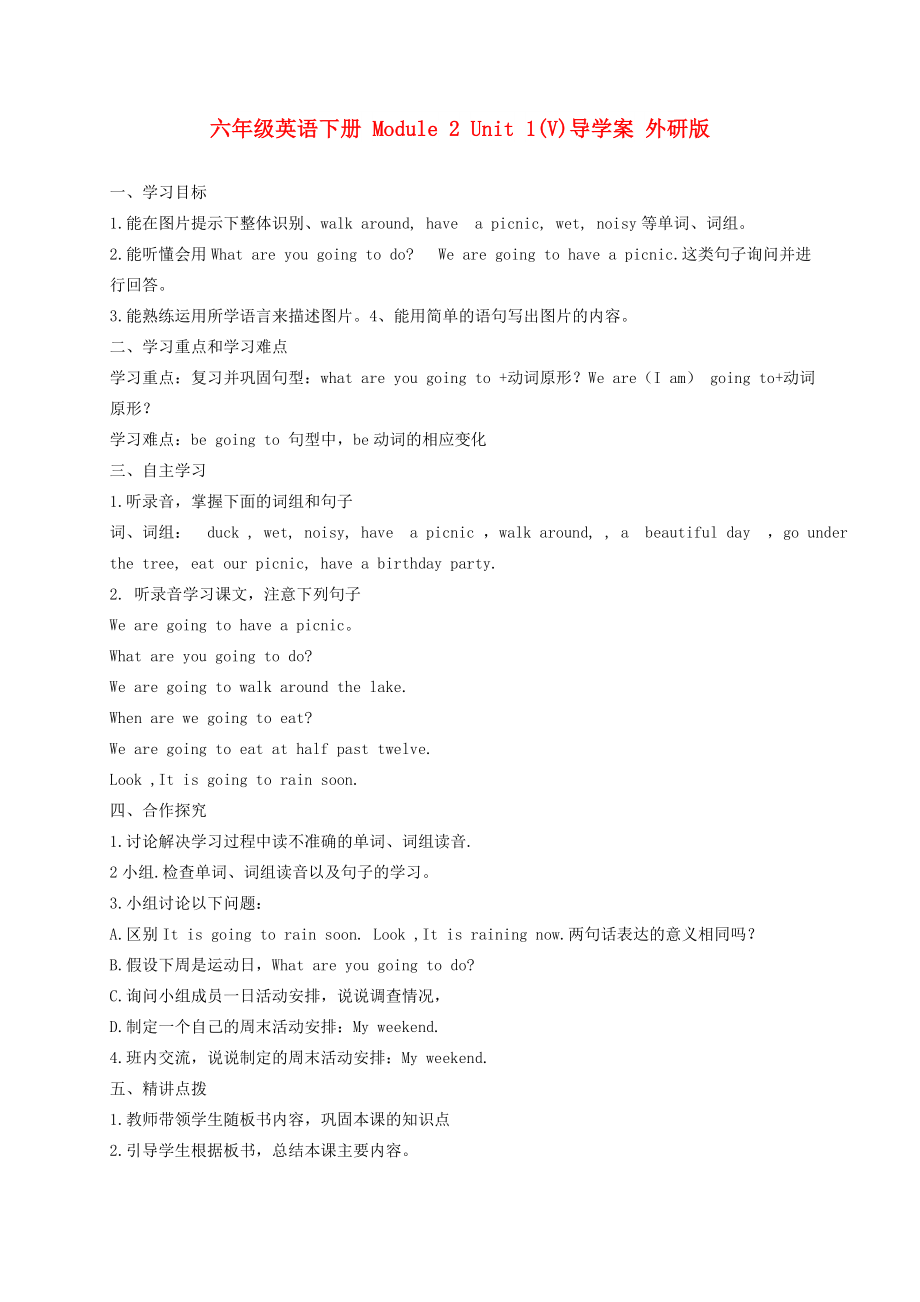《六年級(jí)英語(yǔ)下冊(cè) Module 2 Unit 1(V)導(dǎo)學(xué)案 外研版》由會(huì)員分享����,可在線閱讀����,更多相關(guān)《六年級(jí)英語(yǔ)下冊(cè) Module 2 Unit 1(V)導(dǎo)學(xué)案 外研版(2頁(yè)珍藏版)》請(qǐng)?jiān)谘b配圖網(wǎng)上搜索��。
1���、六年級(jí)英語(yǔ)下冊(cè) Module 2 Unit 1(V)導(dǎo)學(xué)案 外研版
一�����、學(xué)習(xí)目標(biāo)
1.能在圖片提示下整體識(shí)別����、walk around, have a picnic, wet, noisy等單詞����、詞組。
2.能聽(tīng)懂會(huì)用What are you going to do? We are going to have a picnic.這類句子詢問(wèn)并進(jìn)行回答���。
3.能熟練運(yùn)用所學(xué)語(yǔ)言來(lái)描述圖片����。4、能用簡(jiǎn)單的語(yǔ)句寫出圖片的內(nèi)容����。
二、學(xué)習(xí)重點(diǎn)和學(xué)習(xí)難點(diǎn)
學(xué)習(xí)重點(diǎn):復(fù)習(xí)并鞏固句型:what are you going to +動(dòng)詞原形���?We are(I am) going t
2、o+動(dòng)詞原形����?
學(xué)習(xí)難點(diǎn):be going to 句型中,be動(dòng)詞的相應(yīng)變化
三���、自主學(xué)習(xí)
1.聽(tīng)錄音����,掌握下面的詞組和句子
詞����、詞組: duck , wet, noisy, have a picnic ,walk around, , a beautiful day ��,go under the tree, eat our picnic, have a birthday party.
2. 聽(tīng)錄音學(xué)習(xí)課文���,注意下列句子
We are going to have a picnic��。
What are you going to do?
We are going to walk
3�����、 around the lake.
When are we going to eat?
We are going to eat at half past twelve.
Look ,It is going to rain soon.
四�、合作探究
1.討論解決學(xué)習(xí)過(guò)程中讀不準(zhǔn)確的單詞、詞組讀音.
2小組.檢查單詞�、詞組讀音以及句子的學(xué)習(xí)。
3.小組討論以下問(wèn)題:
A.區(qū)別It is going to rain soon. Look ,It is raining now.兩句話表達(dá)的意義相同嗎��?
B.假設(shè)下周是運(yùn)動(dòng)日����,What are you going to do?
C.詢
4、問(wèn)小組成員一日活動(dòng)安排�,說(shuō)說(shuō)調(diào)查情況,
D.制定一個(gè)自己的周末活動(dòng)安排:My weekend.
4.班內(nèi)交流�,說(shuō)說(shuō)制定的周末活動(dòng)安排:My weekend.
五、精講點(diǎn)撥
1.教師帶領(lǐng)學(xué)生隨板書內(nèi)容�����,鞏固本課的知識(shí)點(diǎn)
2.引導(dǎo)學(xué)生根據(jù)板書����,總結(jié)本課主要內(nèi)容�。
六�、鞏固檢測(cè)
聽(tīng)錄音,根據(jù)課文內(nèi)容填空
Dmingming ,Simon and Simon’Mum are having a in the park.They are going to eat tweleve. It is tweleve now. They ar
5����、e going to the lake.Some are swimming in the lake. They are very
And they look very ,It’s raining, They go
a tree in a .Their picnic is ,but the ducks like it, They are it.
七、作業(yè)
制定自己的周末活動(dòng)安排:My weekend.抄寫在札記本上��。
八�、板書設(shè)計(jì)
Unit1 We are going to have a picnic
What are you going to do? I’m going to�����、��、�����、���、���、����、
What’s he (she) going to do? He (She) is going to����、、�����、����、、���、
 六年級(jí)英語(yǔ)下冊(cè) Module 2 Unit 1(V)導(dǎo)學(xué)案 外研版
六年級(jí)英語(yǔ)下冊(cè) Module 2 Unit 1(V)導(dǎo)學(xué)案 外研版

